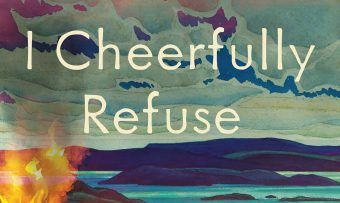

It’s been a good year for reading! I want to take a minute to mention here a few books I’ve read or re-read over the past couple of months—especially those that stood out but that I have not yet mentioned on this blog. If you’re looking for potential summer reading, here you go! But also, do YOU have favorite books (old or new) that have stood out so far this year? I want to hear it!
***
Literary odysseys abound. But Leif Enger’s newest novel, I Cheerfully Refuse—an odyssey whose Odysseus is also part Aeneas, Huck Finn, and perhaps most of all Orpheus—is one of a kind. And in true-to-form Enger, it’s not a fly-by-reading kind of book. Also, you can’t really read it in public—yet another Enger-reading hazard. You need privacy to mourn and weep, as the tale will absorb you utterly, and there is much to mourn here. But it is oh-so-breathtakingly beautiful.
***

Dan got me this book as a present recently, in a nod to our new-ish Ohio residency–the novel tells the tale of very early settlers moving from Pennsylvania to Ohio. I really enjoyed it, but still processing the particulars. But I liked it enough to want to read the rest of the trilogy now.
***
On to a different trilogy. I first read C.S. Lewis’s Space Trilogy about a decade ago, and I thought it was okay. It didn’t knock my socks off, if you will. I re-read the concluding novel in the trilogy, That Hideous Strength, earlier this spring, and this time, it was powerful. I’ve been thinking about it ever since in connection with my larger interest in the post-Christian devaluing of human life and, really, of our society’s relentless attacks on everything that makes us human. The villains in this trilogy are fighting humanity, and this includes fighting marriage and children, by the way—their dream is to offer a way to live forever without, well, traditional human reproduction.
Reading the villains’ anti-children rhetoric reminded me of the similar sentiments we have been seeing of late—all the cringy “dogs welcome, no kids allowed” signs that circulate on social media. But the whole point, Lewis reminds, is that losing (and devaluing) our humanity comes at the cost of losing the soul.
***
I re-read another fantastic book on the topic of humanity—what it means to be human, but also dreams of stronger, more perfect beings. In her Gods and Robots: Myths, Machines, and Ancient Dreams of Technology, Adrienne Mayor gathers stories from Greek mythology that deal with super-human beings that are, what we might call today, robots or artificial life. Bronze giants, crafted maidens, artificial bulls. These stories show, Mayor notes, that our fascination with creating such beings—now ever more advanced, given AI capabilities—is nothing new. It is, rather, a dream three thousand years in the making.

***
Okay, I technically got archaeologist Eric Cline’s new graphic history version of his best-selling book on 1177 BC for my fourth-grader. But I couldn’t help but sneak some peeks. It’s quite impressive! And the (grown up) sequel: After 1177 B.C. is sitting here on my shelf, waiting to be read.

***
I appreciated the opportunity to review recently two new books about Ukraine that are remarkable each in its own way. First, Sasha Vasilyuk’s novel debut, Your Presence Is Mandatory—loosely based on Sasha’s grandfather’s story, offers mournful reminders of the history of Ukraine that continue to be relevant to the current war. (Here is my review in Plough)

And second, Ukrainian journalist Illia Ponomarenko’s military memoir, I Will Show You How It Was, shows why freedom—a free Ukraine—is worth fighting for. (Here is my review in Law and Liberty) It is an important book, as the war drags on now beyond a two-year mark with no end in sight. I look forward to Julie Durbin’s review of this book for Current this summer. Julie has lived in Ukraine—including in Kyiv—for a decade, which gives her a particularly personal connection to the region and this war (you can read here her reflections on her decade in Ukraine as a missionary).
